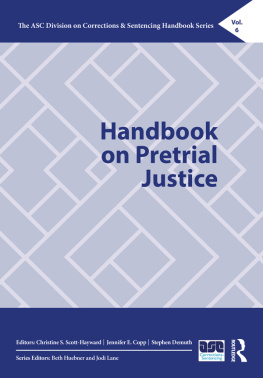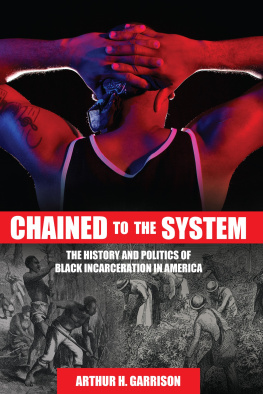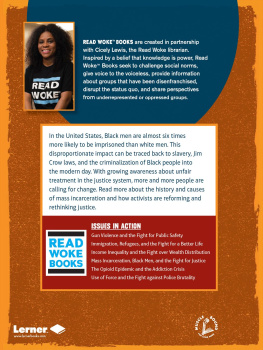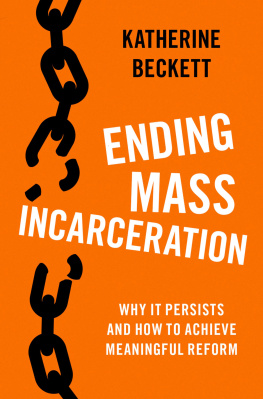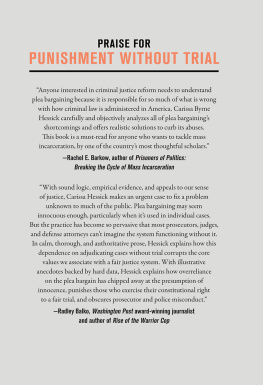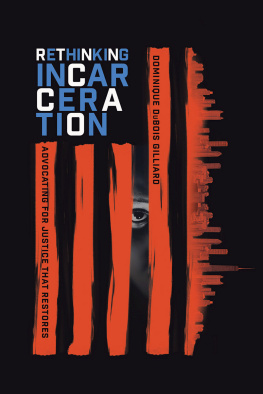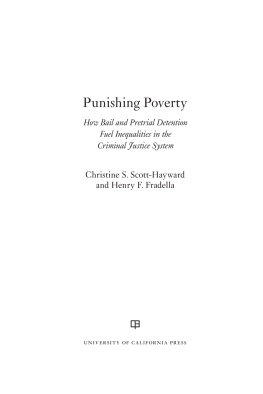Incarceration without Conviction makes an essential contribution to our understanding of mass incarceration. As Rabinowitz compellingly demonstrates, pretrial detention is both a key driver of imprisonment and the cause of many of the same collateral consequences. This book is essential reading for students and scholars concerned about the impact of pretrial detention in the U.S. justice system.
John Hagan, John D. MacArthur Professor of Sociology and Law at Northwestern UniversityIn Incarceration without Conviction, Mikaela Rabinowitz challenges us to squarely face the issue of whether innocence does or doesnt matter in the modern day criminal legal system. With pretrial detention leading so directly to convictions, and harsh incarceration experiences visited upon her interviewees even if theyre acquitted, Rabinowitzs questions about the value of Americas vaunted presumption of innocence are vital to confront.
Vincent Schiraldi, Senior Research Scientist at the Columbia School of Social Work and Co-Director of the Columbia Justice LabIncarceration without Conviction
Incarceration without Conviction addresses an understudied fairness flaw in the criminal justice system. On any given day, approximately 500,000 Americans are in pretrial detention in the US, held in local jails not because they are considered a flight or public safety risk, but because they are poor and cannot afford bail or a bail bond. Over the course of a year, millions of Americans cycle through local jails, most there for anywhere from a few days to a few weeks. These individuals are disproportionately Black and poor.
This book draws on extensive legal data to highlight the ways in which pretrial detention drives guilty pleas and thus fuels mass incarcerationand the disproportionate impact on Black Americans. It shows the myriad harms that being detained wreaks on peoples lives and well-being, regardless of whether or not those who are detained are ever convicted. Rabinowitz argues that pretrial detention undermines the presumption of innocence in the American criminal justice system and, in so doing, erodes the very meaning of innocence.
Mikaela Rabinowitz is the Director of Data, Research, and Analytics at the San Francisco District Attorneys Office, which does not seek to detain people using cash bail. She has a PhD in Sociology from Northwestern University and a BA in African American Studies from Columbia University.
Sociology Re-Wired
Edited by Jodi OBrien, Seattle University, and
Marcus Hunter, University of California, Los Angeles
Sociology Re-Wired captures this combustible moment in American and global societies with new books that innovate and re-configure social and political issues. This hybrid series publishes timely, relevant, original research and textbooks that address significant social issues informed by critical race theory, Black feminism and Queer Studies traditions. Series books are written in a publicly accessible, multi-vocal style broadening the reach and impact of significant scholarly contributions beyond traditional academic audiences.
Some titles published in this series were published under an earlier series name and a different editorship.
Published:
The Black Circuit
Race, Performance, and Spectatorship in Black Popular Theatre
Rashida Z. Shaw McMahon
All Media Are Social
Sociological Perspectives on Mass Media
Andrew Lindner and Stephen R. Barnard
Incarceration without Conviction
Pretrial Detention and the Erosion of Innocence in American Criminal Justice
Mikaela Rabinowitz
Transforming Scholarship
Why Womens and Gender Studies Students Are Changing Themselves and the World
Michele Tracy Berger and Cheryl Radeloff
For more information about this series, please visit: https://www.routledge.com
First published 2022
by Routledge
605 Third Avenue, New York, NY 10158
and by Routledge
2 Park Square, Milton Park, Abingdon, Oxon OX14 4RN
Routledge is an imprint of the Taylor & Francis Group, an informa business
2022 Taylor & Francis
The right of Mikaela Rabinowitz to be identified as author of this work has been asserted by her in accordance with sections 77 and 78 of the Copyright, Designs and Patents Act 1988.
All rights reserved. No part of this book may be reprinted or reproduced or utilised in any form or by any electronic, mechanical, or other means, now known or hereafter invented, including photocopying and recording, or in any information storage or retrieval system, without permission in writing from the publishers.
Trademark notice: Product or corporate names may be trademarks or registered trademarks, and are used only for identification and explanation without intent to infringe.
Library of Congress Cataloging-in-Publication Data
Names: Rabinowitz, Mikaela, author.
Title: Incarceration without conviction : pretrial detention and the erosion of innocence in American criminal justice / Mikaela Rabinowitz.
Description: New York, NY : Routledge, 2021. |
Series: Sociology re-wired
Identifiers: LCCN 2020054374 | ISBN 9781032006185 (hardback) | ISBN 9781032006192 (paperback) | ISBN 9781003174936 (ebook)
Subjects: LCSH: ArrestUnited States. | Presumption of innocenceUnited States. | Preventive detentionUnited States.
Classification: LCC KF9625 .R33 2021 | DDC 345.73/0527dc23
LC record available at https://lccn.loc.gov/2020054374
ISBN: 978-1-032-00618-5 (hbk)
ISBN: 978-1-032-00619-2 (pbk)
ISBN: 978-1-003-17493-6 (ebk)
Typeset in Bembo
by codeMantra
For Lisa, Soraya, and Elliot
On March 1, 2017, Spike TV began its six-part broadcast of Time: The Kalief Browder Story, a TV documentary detailing the experience of Kalief Browder, a young Black teenager who spent three years inside New York Citys Rikers Island Correctional Facility because he was unable to afford $3000 in bail after being accused of stealing a backpack. From the age of 16 when he was arrested until the age of 19 when he was released, Browder maintained his innocence, refusing multiple plea bargains that would have expedited his release and freed him from the persistent physical and psychological violence and deprivation that characterized his life inside Rikers. Ultimately, the District Attorneys Office dropped the charges and Browder was released in May 2013. The years following his release from custody were plagued by post-traumatic stress and psychiatric breakdowns and, two years later, Kalief Browder took his own life, dying by suicide in June 2015.
As the Jay-Z produced documentary illustrates, Browders experiences are exceptional and thus noteworthyhe was only 16 at the time of his arrest; the incident for which he was arrested was minor and the bail amount clearly disproportionate to the alleged offense; the detention facility in which he was held is one of the most notorious in the country; Browders insistence on his innocence and unwillingness to take a plea deal were extremely rare; and the depth of Browders trauma and his eventual taking of his own life are not the usual consequence of pretrial detention. In many more ways, however, Browders experience was rote to the point of mundane. He was a young Black man arrested for a minor offense with the resources for neither private representation nor release on bail; Browders bail hearing likely lasted no more than a couple of minutes, with neither the judge nor the prosecutor truly considering Browders likelihood of appearance in court, risk to public safety, or ability to pay bail; the adjudication process was subject to numerous continuances and administrative delays that kept Browder in custody indefinitely; and ultimately, despite Browder never being convicted of the crime for which he was detained, the consequences of this detention were extreme.


